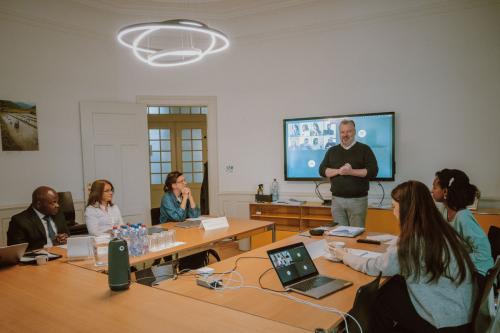Collective Action learning goes online!

We are proud to launch the world’s first fully interactive Collective Action eLearning course.
The new course is part of our ongoing efforts to build practical skills in using this powerful anti-corruption approach, which brings businesses together with other stakeholders to address shared corruption challenges and raise standards of integrity and fair competition.
The course puts you in the role of a young entrepreneur called Martha in the country of “Wakandaa”, who is seeking to engage other stakeholders in efforts to counter corruption and open up more opportunities for small businesses.
A window of opportunity has opened with a new government pledging to crack down on corruption. It’s Martha’s (your!) job to identify who from the private sector, civil society and international community might join together in a Collective Action initiative – and which particular challenges of corruption and fair business you could collectively address.
The course will provide you with practical and hands-on tools to conceptualise, establish and implement Collective Action initiatives.
Who is this course for?
All anti-corruption practitioners who are interested in innovative multi-stakeholder approaches in the business integrity space would benefit from this course.
It is particularly tailored to stakeholders engaged in Collective Action initiatives, including but not limited to:
- Private sector: compliance officers, auditors, risk managers, etc.
- Government: representatives of anti-corruption or procurement agencies, plus ministries of justice or the economy, for example.
- Civil society/international organisations focused on corruption, transparency,- accountability, economic development, sustainability and more.
Implementing Collective Action initiatives: from theory to practice
While the theory of Collective Action is fairly simple, translating it into practice can be challenging. Our course guides you through common challenges, including:
- managing conflicting stakeholder expectations;
- adapting to changing political and economic landscapes;
- finding common goals; and
- perhaps most importantly, building the necessary trust to address these issues collectively.
The course is hands-on and interactive, so when taking the course you can adapt your learning according to your needs and apply your new knowledge directly to your context. It keeps the theory concise and focuses on helping learners to develop their thinking process through guiding questions and interactive scenarios. The ultimate aim is for you to identify what Collective Action could look like in your context.
Content overview
In module 1 you’ll get to know the concept of Collective Action and how to identify Collective Action opportunities. In module 2 you’ll focus on identifying and engaging relevant stakeholders for Collective Action. In module 3 you’ll dive into governance structures for sustainable and successful Collective Action initiatives.
At the end of the course, you will have developed your very own Collective Action roadmap. This will allow you to identify:
- corruption risks in your environment that could be addressed through Collective Action initiatives;
- the stakeholder groups that need to be engaged; and
- the type of Collective Action initiatives that could effectively address the risks identified.
This is a great starting point for discussion with colleagues, partner organisations and our Collective Action specialists at the Basel Institute – who are of course always ready to help via our Collective Action Helpdesk.
The Basel LEARN “universe”
As with all Basel LEARN courses, the Collective Action course is available free of charge and is self-paced. You can start, take breaks and continue at any time, or repeat sessions if you need more practice.
After completing the course, you can download a certificate of completion to share with your employer, future employers and your personal networks.
Take the course
- Register and start your Collective Action learning journey now!
- Explore other resources on anti-corruption Collective Action on our B20 Collective Action Hub.



